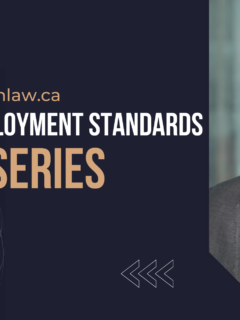In the Employment Standards Act, 2000 (ESA), there are rules for how employers are permitted to make deductions from their employee’s wages. What’s the Difference Between Salary and Wages? Salary is not defined in the ESA, but a definition can be found in the Merriam-Webster Dictionary as “fixed compensation paid regularly for services”. In the …
Employment Standards
The student minimum wage in Ontario is $15.60 per hour in 2024. In Ontario, there is the general minimum wage, which is 16.55 per hour in 2024, and various special minimum wages, including, the student minimum wage. How To Know If The Student Minimum Wage Applies? The special student minimum wage is detailed under section …
In Brief: All About The Minimum Wage Minimum wage is the lowest pay rate that employers are allowed to offer employees in Ontario. The minimum wage is a floor and no employer can go below it. The minimum wage applies to most Ontario workers (but not all workers), including workers working full-time, part-time, casually, or …
Introduction Lieu time, a term that originates from the French word “lieu”, meaning “place” or “instead”, is a solution for managing overtime in the workplace. When employees work beyond their maximum working hours, lieu time provides an option for compensating owed overtime with paid time off. This practice of “lieu time” offers flexibility and aligns …
What is the difference between part-time and full-time hours? There is no legal difference between part-time and full-time hours. Neither employment law legislation nor employment common law recognizes any meaningful difference between part-time and full-time work. Therefore, technically, there is no difference, in terms of any employment law rights, between a part-time worker and a …
Employment Standards and Other Employment Law Legislation and Common Law When an employee works in Canada, they are protected by the employment law of their country and province. When an employee works in one province, but travels to another province or even another country for a short trip on a temporary business, again, they are …
Employers have broad discretion to assign an employee’s vacation time under Ontario’s Employment Standards Act, 2000. In other words, yes! Employers can make an employee take vacation time. ☑Although the Employment Standards Act (“the Act”) does not specifically say an employer can force an employee to take a vacation, there is nothing in the Act that says employers cannot force an employee …
If a statutory holiday falls on a weekend, then employers have to give their employees another day off with pay. Likewise, if a statutory holiday falls on a day that is not normally worked by employees (even if it is not a weekend), then employers similarly have to give those employees another day off with …
A small percentage of employers across Canada are regulated by the Federal Canada Labour Code (“CLC”), and not provincial employment standards. Employers in the following industries are, generally, regulated by the CLC: Employers in the above industries who are governed by the CLC and not provincial employment standards have special layoff rules. To learn about layoffs under …
No, in Ontario, employers cannot force their employees to come into work early for unpaid meetings or the like. Likewise, employers cannot ask their employees to show up early to prepare or get something ready unless they are being paid for all the time they are there. The Ontario Employment Standards Act requires that all “work” is paid. To …









